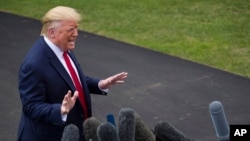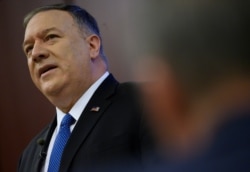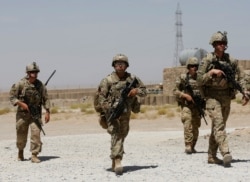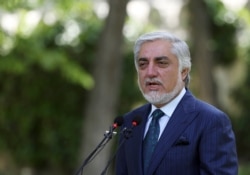Afghanistan’s warring factions have announced they will begin their first direct peace talks Saturday in Qatar to negotiate a political settlement to the country’s long conflict.
The landmark dialogue, brokered by the United States, is officially known as intra-Afghan negotiations. An Afghan government-appointed team of negotiators and interlocutors from the Taliban insurgency will sit at the negotiating table in Doha, the Qatari capital, both parties announced Thursday.
In Washington, U.S. President Donald Trump hailed progress in the otherwise troubled Afghan peace process as an outcome of his administration’s “bold diplomatic effort” to help end nearly two decades of war in the South Asian nation.
“I can announce with great pride that Secretary of State Mike Pompeo will be departing this evening on a historic trip to Doha for the beginning of intra-Afghan peace negotiations,” Trump told reporters.
The talks stem from a February agreement Washington sealed with the Taliban in Doha to extricate U.S. troops from Afghanistan and close what has become America’s longest war, claiming the lives of more than 2,400 U.S. personnel.
Trump noted, however, that no U.S. service member has been killed since the signing of the pact.
“We’re getting along very, very well with the Taliban, and very well with Afghanistan and its representatives, and we’ll see how it all goes. It’s a negotiation,” Trump said.
The deal required the insurgents to immediately halt attacks on U.S.-led coalition forces and open peace talks with rival Afghan groups. It has also bound the Taliban to prevent the use of Afghan soil for international terrorism.
In return, the U.S. has reduced its forces in Afghanistan to about 8,600 from around 13,000 at the time of the signing of the deal, which anticipates the removal of all foreign troops by July 2021.
“These vitally important direct negotiations between the different Afghan parties represent a step forward in bringing lasting peace to Afghanistan. This opportunity is made possible by agreement, signed between the United States and Taliban in Doha earlier this year,” Qatar’s Ministry of Foreign Affairs said in a statement. The Gulf state hosts the Taliban’s political office.
Trump said Thursday that the U.S. military presence “will be down to 4,000 soldiers in a very short period of time.”
The Taliban said in a statement that its negotiating team would join Saturday’s intra-Afghan talks, complying with the agreement with the U.S. Both the rival Afghan sides will discuss conditions for a permanent cease-fire and a power-sharing deal to govern the country after the withdrawal of foreign forces.
“The Islamic Emirate [the Taliban] intends to advance the negotiation process in an appropriate manner and bring about comprehensive peace and a pure Islamic system in the framework of our Islamic values and higher national interests,” the Islamist insurgency stipulated.
A government spokesman in Kabul said that Abdullah Abdullah, who heads Afghanistan’s council tasked to oversee the peace process, will also attend Saturday’s opening session, along with other senior officials.
U.S. and allied troops invaded Afghanistan days after the deadly September 11, 2001, terrorist attacks on American cities and dislodged the Taliban from power for sheltering al-Qaida leaders blamed for plotting the carnage.
The war has since killed tens of thousands of people, including combatants and Afghan civilians, and displaced millions of people inside the country.
Steve Herman contributed to this report.







